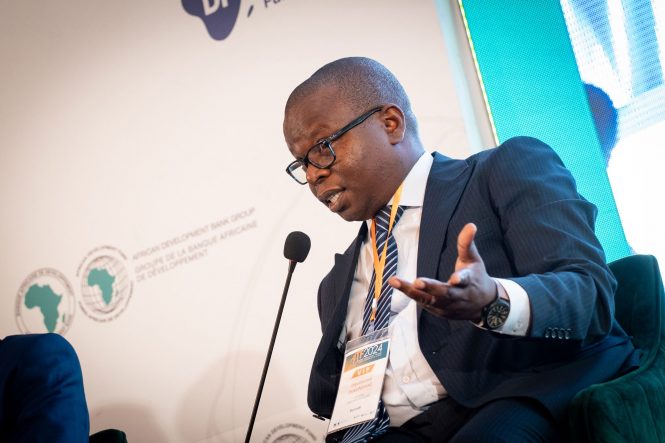
Dieudonné DUKUNDANE, the Minister of Infrastructure, Equipment and Social Housing of Burundi. (Photo: Railways Africa / Craig Dean)
At the African Development Bank Transport Forum 2024 in Abidjan, a critical topic of discussion was the state of connectivity in Africa. Among the key speakers was Dieudonné DUKUNDANE, the Minister of Infrastructure, Equipment and Social Housing of Burundi. He outlined the transformative role that railways will play in facilitating trade across the continent and shared Burundi’s railway development journey, supported by the African Development Bank (AfDB).
Reflecting on the situation two years ago, Minister Nsanganiyumwami highlighted how Burundi had to advocate for and convince stakeholders of the need for a standard gauge railway (SGR) project. “If someone has a container in Harare, Zimbabwe, and they want this box to be in N’Djamena, Chad, what ways of transport could make this possible?” he asked. While sea and road transport face limitations in terms of time, efficiency, and cost, he underscored that “railway is the only game-changer if we are to go for the continental free trade agreement’s full implementation.”
Two years on, he expressed new optimism. Burundi is now gearing up to launch its first railway project, funded by the African Development Bank (AfDB). This development marks a significant shift, positioning railways as the backbone of Burundi’s integration into the continental free trade area and enhancing its competitive edge in international markets.
Why Railways Matter for Landlocked Nations
Burundi, like many other landlocked African countries, faces high costs in moving goods over long distances. “We are located 1,500 kilometres from the seaport. A return trip makes 3,000 kilometres,” the Minister stated, emphasising the logistical challenges of moving a 20-tonne container over such distances. This reality underscores the urgent need for a more efficient mode of transport.
From assessments, the introduction of the SGR is expected to generate significant cost savings. “Once this SGR is in place, we will save nearly $100 for each tonne transported,” he explained. For a cargo of one million tonnes, this translates to a staggering $100 million in annual savings, amounting to $1 billion over a decade. The Minister further noted that countries are currently “burning this money by using non-efficient modes of transport,” highlighting the economic imperative for investment in railway infrastructure.
The Need for Strategic Championship
While acknowledging the necessity of short-term solutions, the Minister stressed the importance of pursuing sustainable, long-term strategies. He argued that the railway sector requires continental high-level strategic championship and leadership to drive structural transformation. “A railway can’t just come like that. It requires huge funding and a huge structural transformation,” he stated. Unlike the road sector, which can easily attract investment from companies selling trucks and fuel, the railway sector demands a different mindset and level of commitment.
Minister Nsanganiyumwami made a call for “continental high-level strategic championship,” stating that railway development needs to be spearheaded by dedicated individuals across the continent. “Wherever we are seeing some development in the railway, behind there is a man, there is a woman who is a champion,” he emphasised. According to him, identifying and empowering such champions is crucial to ensuring the successful implementation of railway projects in Africa.
Burundi’s railway journey stands as an example of what is possible when there is a clear vision, determination, and support from key partners like the AfDB. The Minister expressed pride in the progress made and announced that groundbreaking for the railway project is expected in the next two to three months. “I am very happy to be back in Abidjan telling the story,” he said, reflecting the optimism that comes with witnessing tangible advancements in infrastructure projects.
Minister Nsanganiyumwami’s narrative at the forum underscored the vital role that railways will play in enhancing Africa’s connectivity and trade. His call for strategic championship and collaboration is a reminder that the journey toward sustainable transport solutions requires vision, commitment, and collective effort. As Burundi moves forward with its railway project, it sets an inspiring example for other African nations to reimagine their transport infrastructure and embrace rail as the game-changer for the continent’s economic integration.
Source link : https://www.railwaysafrica.com/news/burundis-railway-ambitions-a-game-changer-for-african-connectivity
Author :
Publish date : 2024-10-04 13:38:32
Copyright for syndicated content belongs to the linked Source.





